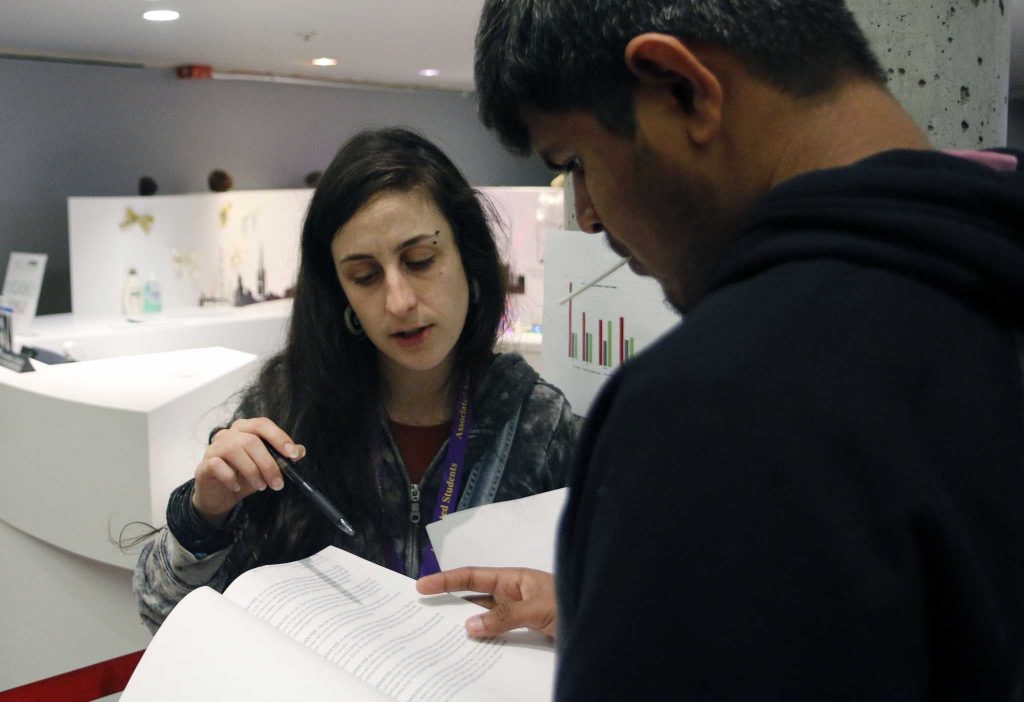Associated Students Inc. were forced to make the most out of their rained out town hall meeting Wednesday afternoon, setting up a station on the lower level of the Cesar Chavez Student Center, serving up hot tea and information on the potential tuition increase to passing students.
According to Celia LuBuono Gonzalez, vice president of external affairs, the goal of the event was to get information out to students about the proposal of a five percent increase in CSU-wide tuition, up for a vote by the California Board of Trustees in March.
Gonzalez also said that she was mainly interested in working with students in brainstorming ways to fight the increase and get their voices and concerns heard.
“The goal is to get students involved collectively, get some ideas on the table, engage in a conversation with them and seek students who want to tell their story and how the tuition increase affects them,” Gonzalez said.
The need for a tuition hike proposal comes from a two-pronged problem, according to Gonzalez.
“The governor of the state of California and the board of trustees are specifically pushing for quicker CSU graduation rates and enrolling more students. The problem is the recession hit and we lost a lot of funding. This year we’re funded pre-recession, but now we’re serving 20,000 more students,” Gonzalez said. “So to make up for that, they raise tuition. We get 50 percent state funding, but we’re still short 2 million dollars of the 157 million that is allocated in funding.”
According to Jordan Thomas, vice president of internal affairs, ASI’s annual town hall meetings are usually sit-down, Q&A style, but this time, they aimed for a casual setting where students can come and go as they please.
“It’s better for people. A lot of students don’t want to sit down and listen to us talk at them and it is easier to get perspective from students from how they feel about the situation, they can stop by and chat or if they have class, just grab a flyer,” Thomas said.
Liana Derus,environmental studies senior, expressed concern about the possible tuition increase and was pleased that ASI did not cancel the event because of the rain.
“As a student, I think we need to look at the bigger picture of why public education isn’t a big priority. There are teachers who have to pay for their own education supplies. I’m glad they didn’t cancel, because this is important. Students need to know this information,” Derus said. “And I love Celia, I think she is one of the most vibrant and energetic change-makers on campus. If it wasn’t for her, we wouldn’t have all this great information and I think all of the ASI board of directors did a great job with this.”
SF State students weren’t the only ones concerned about the tuition increase. Metahoia Siamu, an alumnus of SF State’s sociology program, now a high school counselor at John F. Kennedy High in Fremont, said she was worried for her students who will ultimately be the ones facing the tuition increase if they decided on a CSU.
“The idea of a four-year college is both beautiful and scary. How can we sell the dream of college to our AVID (Advancement Via Individual Determination) students if you can’t afford it?” Siamu said.
Avid is a non-profit organization that offers college readiness classes for high school students, providing organizational and study skills according to avid.org. The program also provides tours to local universities, allowing students to explore what certain colleges offer in terms of majors and classes.
One of Siamu’s students, Jennifer Gonzalez, who was touring SF State with the AVID class didn’t seem too discouraged upon hearing about the potential surge in tuition hikes, since she is counting on scholarships.
“Scholarships help a lot, so I am trying to look at the ones I could get and I’m still considering SF State.It’s close to home and has a lot of majors that I am interested in,” Gonzalez said, who is a junior at John F. Kennedy.
To further get the word out to students about the increase that would be enacted for the Fall 2017 semester if voted on, ASI President Shannon Deloso said that the ASI board of directors will consider reaching out to different ASI programs such as Project Connect and going from classroom to classroom.
“We want to get as many students involved as we can. This is our fight,” Gonzalez concluded.





